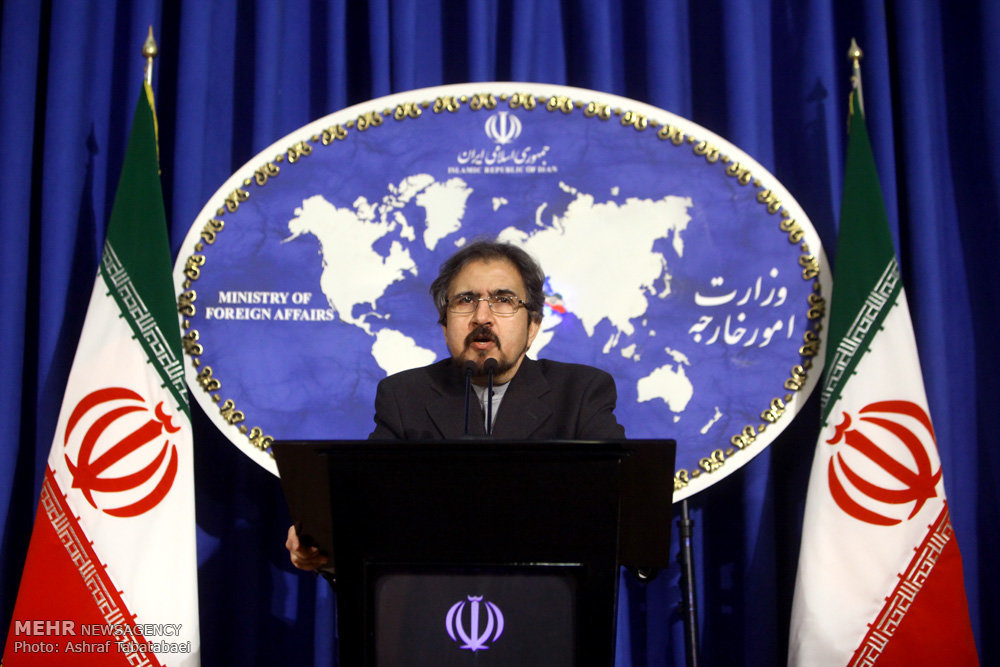Iran, Turkey getting closer on Syria: spokesman

TEHRAN – Backing opposing sides in the Syrian conflict, Iran and Turkey are now in a “better position” vis-à-vis the creation of de-escalation zones in the embattled country, Iran’s Foreign Ministry spokesman said on Monday.
Referring to the unannounced June 7 visit by Foreign Minister Mohammad Javad Zarif to Turkey, Bahram Qassemi said: “In addition to bilateral subjects, the Syrian issue was discussed, and we are now in a better position with regard to creation of de-escalation zones.”
Turkey, Iran, and Russia which also backs the Syrian government, brokered the Astana peace talks, an initiative which focuses unmediated talks between the Damascus government and some rebel factions to settle the crisis.
On Thursday, the Kazakh Foreign Ministry, which has hosted so far four rounds of negotiations, said Russia, Turkey and Iran have postponed a planned round of talks on Syria in Astana.
Moscow had proposed to hold the negotiations on June 12-13. However, Mikhail Bogdanov, a Russian deputy foreign minister, said the negotiations could resume on June 20, adding the date was preliminary, according to Russian news agencies.
The meeting was postponed because the delegations were not prepared, he said without providing further details.
“When the next round will be held depends on the outcome of expert talks in Moscow”, Qassemi added.
Nuanced, technical issues as well as military deployments to the de-escalation zones are key sticking points, he said in reply to a question from The Tehran Times.
Yet, “relative understandings” have been achieved after talks between Zarif and Turkish President Recep Tayyip Erdogan and his Foreign Minister Mevlut Cavusoglu, Qassemi further explained.
On May 4, Russia, Iran and Turkey signed a document during the fourth round of Syrian talks in Astana to establish four “de-escalation zones” in Syria.
Russia, Iran and Turkey had planned to finalize maps of the de-escalation zones by June 4.
The fifth round of the Astana talks should be different from previous ones as Iraqi forces are close to defeating ISIS militants in Mosul and the surrounding province of Nineveh, which marks the end of the “caliphate” in the country.
The most significant achievement of a three-pronged diplomatic effort since the beginning of 2017 to reduce bloodshed in a war now in its seventh year, the deal brought together three of consequential actors in the conflict from opposite sides.
The top United Nations envoy dealing with Syria, Staffan de Mistura, hailed the memorandum, which took force on May 6, as an “important, promising, positive step in the right direction.”
The agreement, which is to last initially for six months, calls for a pause in fighting, including government airstrikes, and for unhindered aid deliveries in and around the four main zones still held by rebels unaffiliated with the Islamic State.
The pact, however, does not apply to militants associated with the Islamic State or a Qaeda-linked group commonly known as the Nusra Front, which were designated as terrorist and hence, left out of the Astana talks.
The de-escalation zones, envisioned as places where displaced Syrian civilians could voluntarily return and settle, include the northern province of Idlib, the central province of Homs, the East Ghouta region outside Damascus, and southern Syria along the Jordanian border.
Neither the Syrian government nor the rebels signed the document although the Syrian government voiced its support for it. Rebel groups objected, arguing it left too many loopholes for the Syrian military to continue what they called indiscriminate bombings of civilian areas.
While the de-escalation zone initiative was implicitly welcome by Washington, which said it supported any effort “genuinely” aimed at creating “a credible, peaceful resolution,” it is unclear how the guarantors will monitor compliance.
Aleksandr Lavrentyev, the Russian negotiator at the talks, told Russian news outlets that his country could send observers and “work more closely” with countries that back the rebels, including the United States and Saudi Arabia.
In an apparent opposition to the remarks, the Syrian government ruled out the “de-escalation zones” being monitored by other actors, including the United Nations.
“We do not accept a role for the United Nations or international forces to monitor the agreement,” Syrian Foreign Minister Walid al-Moallem was quoted as saying at a news conference in Damascus on May 8.
In addition to the compliance issue, the American intervention in the agreed-upon zones is open to question.
Two week ago, American troops attacked Syrian forces, targeting three vehicles that were trying to set up a fighting position on the outskirts of a newly established de-escalation zone close to the Jordanian and Iraqi borders, according to military sources.
AK/PA
Leave a Comment